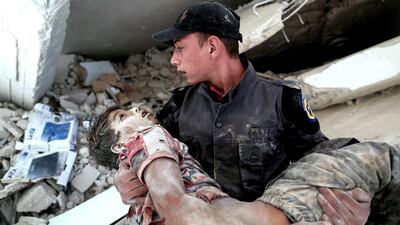With the relentless tide of human misery suffered by innocents in Syria, we have to welcome any deal that could end fighting in most areas of the country. The provisional ceasefire brokered between the United States and Russia, which is to take effect on Monday, seems to offer that prospect.
Nobody would call the agreement perfect – particularly the vagueness about the future of Syrian president Bashar Al Assad, whose clinging to power has visited so much destruction upon his country – but after 10 months of failed ceasefires and the continuing nightmare for millions of civilians, even an imperfect agreement is a cause for cautious optimism.
The Assad regime will stop targeting rebel forces in most areas of the country and there will be a joint US-Russian air campaign against ISIL and other extremist groups. There will also be new negotiations about the country’s political future.
Moderate opposition groups cautiously welcomed the deal, on the proviso that the Assad regime fulfil its obligations. Their condition is entirely understandable, based on the many times the regime has said one thing but then done another, regardless of the human misery such duplicity has had on ordinary people who find themselves standing in the way of Mr Al Assad’s survival and that of his regime.
Of concern will be that there is no clear path for Mr Al Assad to be eased from power, just vague references about discussions between Russia and the regime on that issue. For good reason, many groups in Syria believe that the president is part of the problem and cannot be part of the solution.
But in keeping with the aphorism that “perfect is the enemy of good”, an imperfect deal that ends the carnage in most parts of Syria but continues to sanction raids on radical groups such as ISIL and Al Qaeda is still worth pursuing.
While this might be yet another false dawn, we have to take seriously anything that offers the chance to improve the lot of a benighted generation of Syrians, nearly 500,000 of whom have been killed, with millions more forced from their homes.
As we know all too well, Syria’s problems do not stay neatly within that country’s borders and have already manifested themselves in the refugee crisis and by being a recruiting tool for terror groups world wide.

